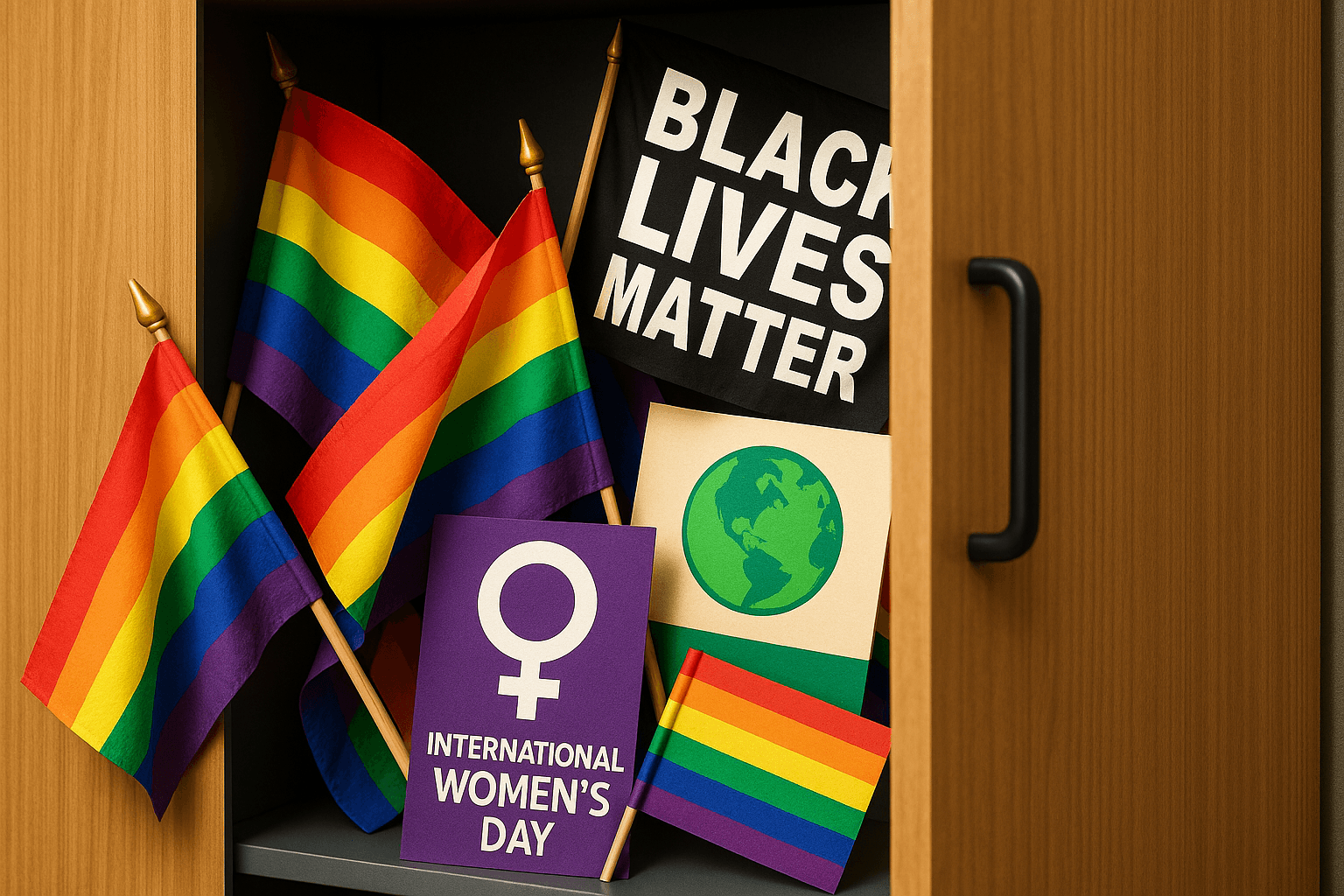Over the last decade or so, companies large and small have firmly embraced the idea of having values. Whether it’s corporate social responsibility (CSR) or environmental social governance (ESG), values largely focus on environmental sustainability as well as diversity, equity and inclusion (DEI). Today, however, those same concepts are viewed cautiously, with net zero and DEI becoming highly politicised.
This spells trouble because – in many cases – it means that the once uncontroversial values that companies spent so much effort to embed into their organisations have become partisan issues. So should they back down from their values or proudly nail their colours to the mast?
Why DEI has become political
Backing down, maintaining or reaffirming values carry risk. Since the election of President Trump, who has fiercely criticised sustainability and DEI policies, and has taken action against organisations that have them, large companies across America have publicly scrapped their DEI and sustainability programmes or removed mention of them in public-facing materials.
Reportedly, this includes:
- Amazon, which removed references to diversity and inclusion from its 2024 annual report
- AT&T, which stopped encouraging employees to wear pins with their preferred pronouns
- Meta, which removed sections of its sustainability page
- Six of the biggest US banks, as well as HSBC, which left the Net Zero Banking Alliance
- BlackRock, which withdrew from the Net-Zero Asset Managers (NZAM) initiative
- Boeing, which got rid of its DEI department
- Disney, which replaced references to “diversity & inclusion” and removed a website highlighting diverse employees – and we’ll have more on Disney’s values soon….
The politicisation of DEI continues here in the UK. Reform, which won most seats in May’s local elections, also has sustainability, diversity and inclusion in its sights – with Reform controlled councils planning to scrap any DEI and net zero policies.
Rolls Royce is one of a small number of large British companies to follow the trend set by US giants by scrapping diversity programmes, but more are likely to follow.
So is it time for companies to rein in their DEI values or is it better to hold firm?

The example of Disney’s fifth key
To look at how companies can and should respond to this cultural change, let’s look again at Disney, which has experienced the full range of unintended consequences related to values…
Disney has always been known for the morals and values contained in its films and theme parks, but as part of a gradual shift throughout the organisation in 2021, Disney Parks – a division of the larger company – introduced its ‘5 Keys’, which marked a clear evolution in the company’s values.
These were an evolution of the brand’s ‘Four Keys’ (safety, courtesy, show and efficiency), which were in place for the previous 65 years, with the addition of the fifth key ‘inclusion’. This new value was about “creating a place where everyone is welcome and taking action to create meaningful change”.
“Because to create a world where everyone belongs, where each person is treated with respect, we must work together to reimagine tomorrow. We’re building a Disney with more diverse stories and experiences, a Disney with more accessible products and authentic voices, a Disney where our cultures unite us, not divide us, and where each cast member is empowered to speak up, team up, take action and enjoy equality in every way. The key to unlocking this is working together because together we can create cultural transformation and allyship to improve the lives of all our cast members and communities for years to come.”
– Disney Parks
How inclusion became a problem for Disney
A year after this policy was launched, Disney got into hot water after it announced plans to move some of its teams from California to Florida, where the state had passed laws that prevented schools from teaching children about sexual orientation and gender identity (dubbed the ‘Don’t Say Gay’ bill). Considering that this relocation seemed to directly contradict the company’s new values, this sparked cast member fury, prompting Disney to speak out and criticise the policy.
While this was an example of Disney (eventually) standing up for its values, it began a very tense stand-off that saw Disney and the Republican governor of Florida battling over the governance of the Disney World property. This was a serious problem that threatened the company’s autonomy, tax liabilities and control of infrastructure around its largest resort. It also drove a wedge between Disney’s fans by firmly positioning the company on one side of the growing culture war in America.
After this, the company doubled down on inclusivity by closing its popular Splash Mountain log flumes – based on a film with troubling depictions of black Americans – and retheming them to Princess and the Frog, which features a black, female protagonist. Again, this was an example of the company staying true to its values, but it also stirred a hornet’s nest.
Disney also embraced diversity in its films, with Star Wars having its first blink-and-you-miss-it gay kiss in 2019, Disney’s first openly gay character in 2022’s Strange World, and a string of films with BME and female lead characters – all of which drew criticism from some circles while also being praised by others.
From our perspective as Brits, these were all pretty tame attempts at inclusion (even The Archers had a gay kiss in 2004!) but they royally annoyed a large section of the American public that was becoming increasingly influential.
Then came the live-action remake of Snow White, which cast a Latina actor in the lead role, sparking years of backlash on social and mainstream media.

This all had an impact on Disney’s reputation – a survey at the start of 2024 found that, in the US, the company was the least liked Hollywood film studio and one of the least liked major American companies overall, with 21% having an unfavourable opinion of it.
It also happened to draw the attention of the new US Government in 2025, with the chair of the Federal Communication Commission writing to CEO Bob Iger to tell him that the agency’s enforcement bureau was to investigate the Disney’s DEI policies, making sure the company was not “promoting invidious forms of DEI discrimination”.
How Disney ditched diversity
The shift away from DEI began when a prominent group of stakeholders – most notably billionaire investor Nelson Peltz were trying to get the company to stop being ‘woke’.
Iger saw off the investor’s attempts to get a seat on Disney’s board of directors, but the changing political climate prompted the company preemptively signal a change in the wind anyway:
“Infusing messaging is not what we’re up to… We need to be entertaining.” – Bob Iger, CEO of Disney
As Trump’s reelection looked increasingly inevitable, the company budged. As well as the aforementioned closure of DEI focused websites and changes in its internal communications, Disney reined in on its diversity and inclusion efforts in other ways too: Reported examples include the axing of a transgender storyline from animated series ‘Win or Lose’, softening the content warnings that appear on its older films on Disney+, pressuring film-makers to make the lead character of Inside Out 2 “less gay”, and the director of the Lilo & Stitch remake has also expressed frustration that he wasn’t able to have an alien dress in drag, as was the case in the original.
Disney’s latest move away from inclusion was the announcement of a new theme park in the United Arab Emirates, where homosexuality is illegal… so much for that inclusion key!
But will these changes help ‘the House of Mouse’ restore its reputation?
While the changes may please right-wing movie-goers and holiday-makers, and it may get the government off it’s back, the company is also turning plenty of its more left-leaning supporters and marginalised communities against it, drawing widespread criticism from even stalwart ‘Disney adults’. Comments on its social media posts announcing the Abu Dhabi park are a tidal wave of complaints and criticism of the company’s hypocrisy and alleged betrayal of its values.
Why abandoning values is high risk
The thing about values is that they’re not supposed to change under outside pressure. If they do, then they’re nothing but words on a page – it throws out credibility and undermines any values they cling to in future. And, as the reaction to the Abu Dhabi park shows, it affects reputation. But it can be worth all that.
To explain why giving up on values is such a risky move, we should look at one of the main reasons companies make them in the first place – they’re meant to appeal to stakeholders.
Staff, consumers, investors, neighbours, and – for a company the size of Disney – even the government… they’re all people who have their own values, motivations and aspirations and a company’s values are designed to align with theirs. There’s been a great deal of research that shows how each type of stakeholder is more likely to support an organisation that shares their values and which they can identify with. So, in basic terms, if the people you want to impress like sustainability, then you should like it too…
For generations, Disney’s values have done it great credit – particularly in America, where a trip to Disney is either a rite of passage or a regular ritual, and its films, TV shows and Walt Disney himself are viewed as part of American identity and history. This has undoubtedly helped the company attract and retain investment, sponsorships, staff and consumers, with decisions about Disney often being made with the heart rather than the head.
But when values are undermined, stripped away or contradicted, it pulls the rug from those people who’ve backed it – it makes stakeholders feel like they’ve been betrayed or fooled, and it pushes them away. For your employees, values help them feel like they’re work is about more than simply earning money because, through their work, they’re making a positive difference in the world, and the same goes for many consumers. And considering that those stakeholders are the most important target audience for a company, you have to be certain that ditching values is worth the risk.
Should you ditch DEI values?
Sticking up for your values against external pressure is a bold, brave and divisive action that will strengthen support among those who share your values, but it will alienate and annoy those who don’t. After all, values are more meaningful (and valuable) if they’re a challenge to uphold – and, so long as the audience you’re impressing is the most valuable to your business, you don’t need to appeal to everyone.
Likewise, ditching, contradicting or simply overlooking your values will frustrate and upset your most loyal supporters, who’ll lose trust in you and disassociate from you as a result, but it might win favour with those who oppose your values, broadening your overall appeal.
Fundamentally, a calculation needs to be made as to which route best serves your business and which group is the more valuable to have on your side.

Whichever route you take, values should be treated seriously and shouldn’t be cast aside easily, but if the circumstances that created those values change, then it’s sensible for the values to change too, as long as you’re sure it’s what your stakeholders want and it’s what’s best for your business in the long term.
You also need to be mindful of the long term damage that betraying your values will have on your reputation and trustworthiness, because once trust is gone, it’s extremely hard to win back.
So, did Disney do the right thing?
At the end of the day, the role of a business isn’t to be a beacon of morality – a calculation has to be made and, controversial as it may sound, Disney probably made a calculated decision when it reined in its policies.
Between 2021 and 2025, a key stakeholder for Disney – the US government – had completely changed in terms of values and ideology. Being ‘woke’ was rubbing people the wrong way, it was making the company a target, and it was threatening to undermine its business.
The company will have knowingly taken the risk of upsetting some stakeholders to please others and avoid more unpleasant outcomes. It tried to mitigate the risk by quietly renaming policies, removing web pages and changing internal processes, rather than more drastic action, hoping it could strike a balance and flee the battlefield of the culture wars…. And make a lot of money in Abu Dhabi. Overall, the company will be hoping these changes will be worth the loss of support of its more liberal, and potentially more loyal fans, who, they’ll hope, will stick with them anyway.
Don’t commit to values you can’t keep
I’ll leave it to you as to whether you think Disney has done the right thing morally and how that makes you feel about their brand, but maybe there was also an error of judgment in how the company established its new values in the first place.
Just as companies need to be careful when giving up values, they should also be careful when setting them. In this regard, I think we can accuse the creation of Disney’s ‘five keys’ and other DEI schemes of being both hollow and shortsighted: Hollow, because, despite the heavily marketed fanfare, the company seemed to undermine it’s new values without a second thought so we have to question whether it was ever truly committed to them; shortsighted because they didn’t consider that circumstances might change and what they would do in response – They didn’t decide whether they would stand up for their values.
Disney should have considered how it would react if these values were tested before committing to them – because a value only has meaning if you’ll stand by it. Otherwise, you just look like you’re taking the Mickey.



